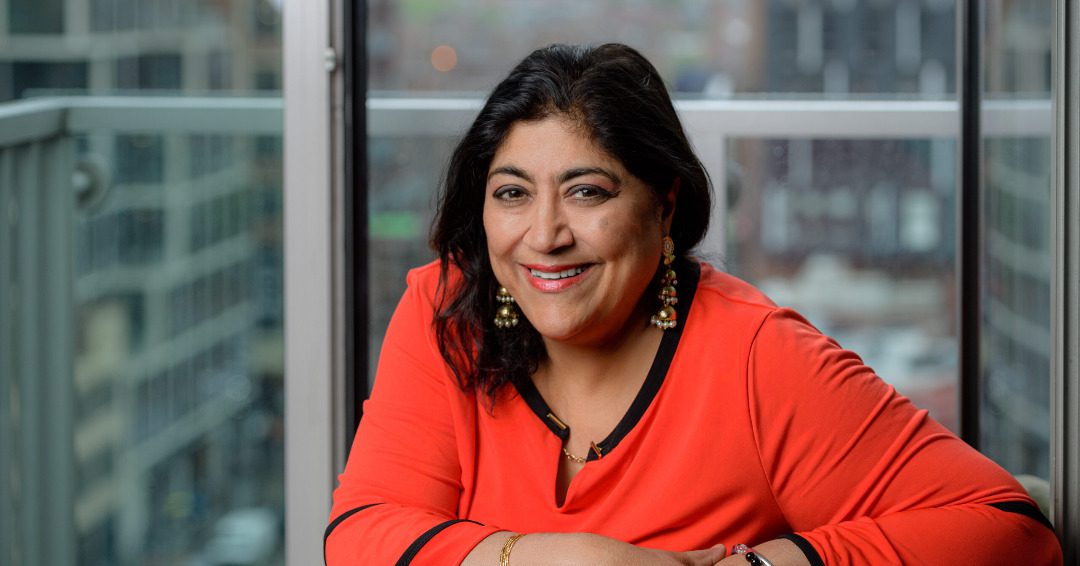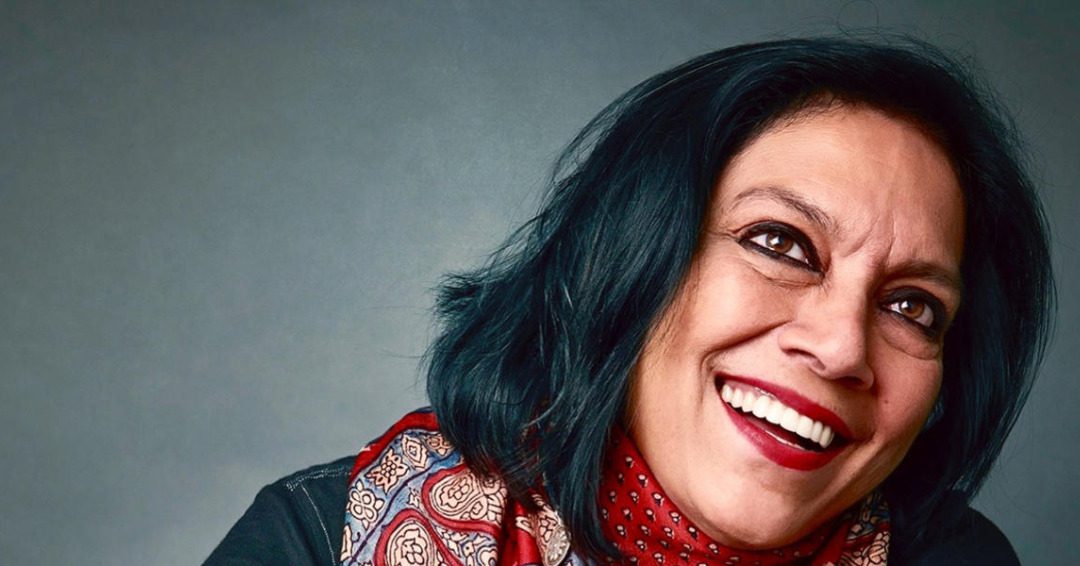(September 8, 2021) “I was married at your age. You don’t even want to learn how to cook dal.” Who can forget this epic dialogue from the 2002 film Bend It Like Beckham. A film that brought the Indian diaspora alive on the big screen, all thanks to Gurinder Chadha. A name that has carved a niche for herself in the British film industry with her perfect art of balancing cultures. The Order of the British Empire Award winner has been smashing cultural stereotypes ever since her first film, and has become a force to reckon with in the world of international cinema.
Decades ago though, filmmaking was least on Chadha’s mind as she was studying development studies. However, a fateful trip to India moved Chadha in a way that she knew what she had to do. That one decision gave the world one of its best female directors. Here’s the story of this Global Indian who is bringing stories that matter to the big screen.
Finding a voice through media
It was in Nairobi that Chadha’s story began in 1960, but two years into her birth, the scenery shifted to London after her parents left Kenya owing to the political turbulence at the time. South Hall became their new home, but the challenges of being a Sikh family in a white country dawned upon them with each passing day. Her Sikh father, a qualified bank officer, couldn’t find a job at Barclays because of his beard and turban; he eventually had to open a shop to meet the family’s financial needs. These initial struggles left an indelible mark on Chadha; seeing the prejudice prevalent in the 70s and 80s, she realized that people like her were marginalized.
This was something that Chadha wanted to change, and she believed that a career in media could give her the voice to bring about that change. When she was 18, she happened to travel to India where she read an article on the depiction of Indian women in cinema that changed things for her. The submissive projection of women made Chadha realize that she needed to change it and joining the media was somehow the answer to it all. After completing her Development Studies degree at the University of East Anglia in England, she began working as a reporter for BBC Radio in Birmingham to tell the stories of people like her and bring them from the sidelines to the center of the frame. However, a young Chadha realized that telling your own stories in the newsroom could be quite a battle. She, then, switched to television. It was here that she found her cinematic voice when she directed documentaries for British Film Institute, BBC and Channel 4. Through these documentaries she gave voice to the stories of British Asians, and she found the process to be quite cathartic. Such was the impact that in 1990, Chadha established her production house, Umbi Films, and that too, without any formal training in filmmaking.
In a conversation with British Film Institute, she said, “I wanted to make films that would appeal to as many people as possible to create change, and I was completely and utterly motivated by racism and prejudice.”
Smashing the stereotypes
Chadha was undeterred, she soon directed her first short film Nice Arrangement in 1991 which gave the audience a sneak-peek into a British Asian wedding. The 11-minute film grabbed eyeballs and was selected for the Critic’s section at Cannes Film Festival. The next year brought with itself Acting Our Age, a documentary on the residents of a South Asian home for the elderly in Britain. The film premiered at South Asian Film Festival in Florida and Art in General at New York City. While Chadha had become a favorite at film festivals, her first commercial potboiler that put her on the global map was Bhaji on the Beach. The film gave a sneak-peek into the lives of Asian women living in the UK and sparked a dialogue around prejudices faced by them in everyday life.
View this post on Instagram
With this, she became the first British Asian woman to direct a feature film and earn a BAFTA nomination for Best British Film. Bhaji on the Beach catapulted Chadha into the league of the best as the film received critical success for its take on racial stereotypes, immigration and gender roles. With her first success, Chadha chose not only to own her British-Asian identity but also to define her work by it.
With Bhaji on the Beach, Chadha started smashing the stereotypes and extending South Asian diversity to the global arena. In 2000, What’s Cooking by Chadha not only became the opening film at Sundance Film Festival but was also the first British script to be invited to the Sundance Institute’s Writer’s Lab. With each film, Chadha began spreading her wings and putting out stories that needed to be seen and heard.
A film that made her a global icon
But 2002 was a game changer for Chadha, all thanks to Bend It Like Beckham. Another story from the Indian diaspora hit the screens that year but it had all the ingredients to be a hit maker – vibrant music, affable characters and a strong storyline. The film was a celebration of Indianness, multicultural identity and inclusivity. Such was the reception that it became the highest-grossing British financed film ever in the UK and topped the box-office charts in the US, Australia, South Africa and New Zealand. Even Tony Blair, the then UK Prime Minister, couldn’t keep calm and wrote a congratulatory message to Chadha saying, ‘We love it because this is my Britain.’ If the film won the hearts of people across the globe, it also earned a Golden Globe nomination for Best Picture, a BAFTA nomination for Best British Film and a Writers Guild of America nomination for Best Original Screenplay.
“The film helped us British Asian immigrants come to the table, sit at it, and be a very much inclusive part of the society. It was able to break through the barriers of race, culture and nationality, and show the British that at the end of the day, we all laugh and cry at the same things and raise our children the same way, and that, just like them, this community ultimately just wants a better life for their kids too,” she told Open Magazine.
The popularity of Bend It Like Beckham gave way to her 2004 film Bride and Prejudice that had Aishwarya Rai in the lead role. Chadha’s twist to Jane Austen’s classic Pride and Prejudice got a thumbs up from fans and critics alike. “It was my attempt to introduce English audience to Hindi filmmaking style,” she added.
Two years later, Chadha was conferred with the prestigious Order of the British Empire award for her service to British cinema.
Her next big production came in the form of Viceroy’s House, a film on the Partition. As a child, Chadha had heard stories from her grandparents about how they had to flee from Pakistan. This left a lasting impact on her mind, and she knew that she would one day make a film on it. But it was after the birth of her twins that she mused about her legacy; she knew she was ready for this film. However, getting financing for her film wasn’t easy despite delivering hits like Bhaji on the Beach and Bend It Like Beckham. In an interview with FirstPost, she said, “In the West, it is always difficult to get finance if you put a person of colour in your film. There is still this perception that whites won’t watch it if there is an Indian in the lead even as I have proved (otherwise) again and again globally. The issue has existed since I made Bhaji on the Beach. I have got to work harder, but I’m prepared to do it.”
Despite the struggles, Chadha managed to break into a male-dominated industry with her first feature film, and since then, there has been no looking back for this British-Indian filmmaker who has been recording the perspective of Indian diaspora on the big screen like no one else.

